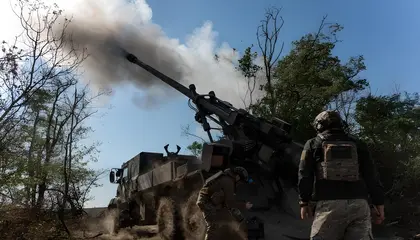Overview:
- Missiles target the city of Zaporizhzhia and drones attack much further west
- Fighting continues along the Dnipro, but Ukrainians hold their ground
- UN humanitarian arm warns of tough Ukrainian winter ahead
- New Russian armored vehicles soon will be drone-proof, one blogger says
- Uzbek court convicts man for serving as mercenary in Donetsk
- Russians inch closer to their target of Avdiivka coke plant
UN petitions the world not to forget about Ukraine
“While much international attention is rightly concentrated on the grave events in the Middle East, it is important that we do not lose focus on other crises,” the director of coordination for the UN's humanitarian office, OCHA, Ramesh Rajasingham, said on Tuesday, AFP reported.
Rajasingham was addressing the UN Security Council, of which Russia is still a member, and warned that, while the humanitarian crisis in Ukraine was already severe, with “relentless attacks on civilians,” his office is expecting a more acute situation come winter.
JOIN US ON TELEGRAM
Follow our coverage of the war on the @Kyivpost_official.
“Significant damage and destruction of critical infrastructure continues to severely impact access of the civilian population to electricity, heating, water and telecommunications,” he said, adding that some 18 million Ukrainians are in need of humanitarian assistance.
“As winter approaches and temperatures start to drop below freezing, humanitarian needs will be magnified.”
Rajasingham also underscored that the roughly four million Ukrainians living in the occupied and contested regions of Donetsk, Kherson, Luhansk and Zaporizhzhia will not be in a position to receive UN aid deliveries.
Russian missiles and drone attacks rain down across Ukraine
As highlighted by the Institute for the Study of War (ISW), the General Staff of the Armed Forces of Ukraine (AFU) reported on Tuesday that Russia launched four Iskander-M missiles and an S-300 air-defense missile at various civilian targets around Ukraine. One of those missiles struck Zaporizhzhia’s capital city, the regional military administration head, Yurii Malashko, posted to Telegram, along with photos of demolished civilian homes.

N. Korean Troops Massed in Russia to Enter Ukraine War ’Soon’: Pentagon Chief
Meanwhile, in areas far from the fronts, Russian drones were reported dropping ordinance on multiple locations. Facebook users in the Khmelnytskyi region, southwest of Kyiv, and also the Poltava region just east of Kyiv, warned their neighbors about local attacks by Shahed-131/136 drones:
Operations: Dnipro River
Ukrainian troops continue to hold their ground on the left bank of the Dnipro River, Russian military bloggers posted on Tuesday, while Russia hunts down their positions with relentless air strikes.
The milbloggers specified that AFU detachments are holding positions in Krynky (2 km from the Dnipro River) and near the Antonivsky roadway and railway bridges that have been contested for weeks. Citing Russian sources, the ISW reported that Ukrainian forces attempted to break through Russian defenses near Pishchanivka, which sits three kilometers from the Dnipro, and in Poyma, four kilometers from the river.
The Russian presence by the river includes elements of the Russian 126th Separate Coastal Defense Brigade (22nd Army Corps) which is based near Simferopol, the ISW noted.
Moscow’s forces have continued airstrikes to combat the entrenched Ukrainian troops and especially their reinforcements on the right bank, using glide bombs against targets on the west bank on Tuesday.
“The enemy carried out 10 air strikes with the use of 45 guided bombs in the settlements of Kherson and Berislav districts,” Ukraine’s Southern Operational Command reported on Facebook. “Nearly forty houses were destroyed and damaged… Two times the enemy used FPV drones and dropped [munitions] on the settlements of the right bank... As a result of air strikes and artillery shelling, one civilian was killed, 17 were wounded, four administrative buildings, a library, hostels, over 10 private houses, and a transformer substation.”
Operations: Avdiivka
The ISW reported that Moscow’s forces made confirmed advances in the Avdiivka area on Tuesday, moving closer to their objective of overtaking the plant in the city that produces coke (an important ingredient in steelmaking).
Geolocated footage in multiple posts indicates that Russian forces marginally advanced just southwest of Avdiivka, and southwest of Krasnohorivka.
One military blogger insisted that Russian forces are not actively attacking the coke plant and are still preparing for a ground assault, ISW reported, while another Russian milblogger confirmed that those forces have “advanced to the outskirts of the Avdiivka industrial zone.”
Next generation of drone-proof infantry fighting vehicles on the way?
With weaponized drones continuing to play a central role in the Russian invasion and Ukrainian counteroffensive, one Russian military observer suggested that a new series of Moscow’s fighting vehicles in the near future will be drone-proof.
The Telegram post on Tuesday by Russian observer Aleksandr Sladkov predicted without offering too many specifics that invading forces will soon roll out infantry fighting vehicles (IFVs) that will be equipped with “electronic warfare (EW) systems that provide special protection from FPV drones.”
“In the near future, our infantry fighting vehicles (and my fellow Kurgan citizens are taking part in this, as part of the military-industrial complex)… will probably be provided with infantry fighting vehicles with the means to protect against FPV drones,” Sladkov wrote. He reported the Kurganmashzavod factory in his native Kurgan region will produce them.
Uzbek court sentences man for serving in mercenary army in occupied Donetsk
The ISW reported on Tuesday, citing Russian opposition paper Meduza, that a court in Tashkent has sentenced an Uzbek man who allegedly served in the Donetsk People’s Republic (DNR) militia from 2014-2015, under Uzbekistan’s laws that prohibit mercenary activity.
According to the ISW’s researchers, relatives of the convicted man “claimed that he did not participate in the war in Ukraine and was in Russia during the indicated years. This sentencing may heighten tensions between the governments of Russia and Central Asian countries as Russian authorities have increased efforts to coerce Central Asian migrants into Russian military service.”
You can also highlight the text and press Ctrl + Enter









